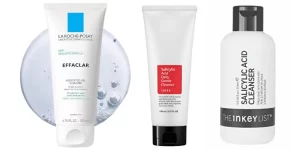
So you’ve been following and sticking with your skincare routine yet it doesn’t seem to be working because your acne is still here.
You’ve tweaked your routine, switched up your skincare products and nada.

What’s going on? Well, lots of things contribute to acne, like hormones, blocked pores, sebum production and acne-causing bacteria to name a few.
But what about your diet? Is what you’re eating causing you to break out?
| this post may contain affiliate links, which means if you purchase from one of these links, I may receive a small commission at no additional cost to you. |
How does diet affect your skin?
Certain foods raise your blood sugar more quickly than others and this causes your body to release insulin.
Too much insulin in your body tells your glands to produce more oil. Which increases your chance of getting acne.
When your blood sugar rises quickly, it causes the body to release a hormone called insulin.
Having excess insulin in your blood can cause your oil glands to produce more oil, increasing your risk of acne.
Pasta, sugar, white rice and white bread are some of the most common foods that trigger insulin spikes.
How does diet affect acne?
Improving acne and your health through your diet comes down to these factors:
- Getting more nutrients. Your body needs a variety of vitamins, minerals, fatty acids, amino acids etc to function properly. If you eat foods with little to no nutritional value your body loses its ability to properly heal damaged tissue and reduce inflammation.
- Improving your gut health. The trillions of bacteria in your gut play a role in everything, including the health of your skin. If your gut is healthy your skin’s health. So keep your gut healthy and happy.
- Regulating your hormones. Lots of foods can disrupt your hormonal balance so it’s better to avoid them.
- Regulating your immune system. Do this by eating healthy foods, that support your gut which helps boost your immune system.
5 Acne food causes
1. Refined grains and sugars
Yup, eating lots of sugar (sodas, maple syrup, agave, honey) and refined carbs (like bread, cereal, pasta, rice, and crackers to name a few) can contribute to your acne. These foods cause your insulin levels to spike and all the excess insulin signals your body to increase its oil production in the skin.
All this excess oil can lead to your pores clogging up. This natural reaction also causes inflammation which helps create the perfect environment for acne bacteria to thrive.
2. Dairy
Research shows that dairy products, specifically milk, contribute to acne and breakouts. And skim milk isn’t any better either. But why is this?
Well, the hormones given to cows can interfere with the normal functioning of your body. These hormones make cows produce more milk but when you drink that milk one of your body’s reactions is to overproduce oil.
Cow’s milk has amino acids that increase the insulin-like growth factor (IGF-1) in your body. IGF-1 is part of your body’s tissue growth and development. The result is that your body makes more oil which means there’s more oil on your face that can block your pores.
Skim milk isn’t any better for your acne either, because the added sugar and whey protein in skim milk can help cause inflammation in your body and skin.
3. Fast food
Not only is fast food bad for your waistline but it’s also bad for your skin. We all know fast food isn’t great for us, it’s the cause of so many health problems but it just tastes so good!
If you’re fighting acne, overly processed, fatty foods aren’t your friends. Foods with high saturated fats and processed ingredients can disrupt your hormonal balance and blood sugar levels and show themselves on your skin. So do your best to cut back or get rid of fast food altogether.
4. Foods rich in omega-6 fats
Eating a diet of large amounts of omega-6 fatty acids and not enough omega-3 fatty acids, can cause inflammation and acne. Eating foods with high amounts of vegetable oils, processed fillers and inflammatory sugars pushes your body into an inflammatory state, which can worsen acne.
Too many omega-6 fatty acids in your diet can also raise your blood pressure, increase your risk of blood clots, heart attack and stroke, and cause water retention.
5. Foods you’re sensitive to
Acne is inflammatory and when you eat foods your body is sensitive to your immune system sees it as a threat and launches an immune attack against it. This results in pro-inflammatory molecules circulating in your body which adds more inflammation and can make your acne that much worse.
If you’re not sure what foods you’re sensitive to the best way to figure out if you have any triggers is by completing an elimination diet. You slowly eliminate certain foods from your diet to see if your skin improves before adding them back all while tracking your symptoms and looking for patterns.
What to eat instead
These are foods and nutrients that may help keep your skin clear.
- Omega-3 fatty acids: Omega-3s are anti-inflammatory, and can help reduce inflammation in your body and help calm acne
- Probiotics: Probiotics help balance your gut and microbiome, which then helps reduce inflammation and acne
- Green tea: the polyphenols in green tea help reduce inflammation and lower sebum production. You can even use green tea on your skin to help calm down inflammation.
- Turmeric: the curcumin in turmeric contains anti-inflammatory properties, which can help regulate blood sugar, improve insulin sensitivity and stop the growth of acne-causing bacteria
- Vitamins A, D, E and zinc: These nutrients are super important for the health of your immune system and skin. And not having enough madness your skin is more susceptible to acne.
- Mediterranean-style diets: A wholesome and well-rounded diet full of fruits, vegetables, whole grains, legumes, fish and olive oil and low in dairy and sugar helps keep your gut and immune system happy which means your skin is happy.
Final thoughts
You could be doing all the right things like following a great skincare routine and using all the right products. But if your diet consists of foods that trigger inflammation and excess oil production then it’s very hard to clear up acne.
Now it’s not necessary to get rid of all the food on this list. Just enjoy them in moderation and eat more skin-healthy foods the majority of the time.
In the meantime, keeping a food log to identify patterns between the foods you eat and the health of your skin might be helpful.



